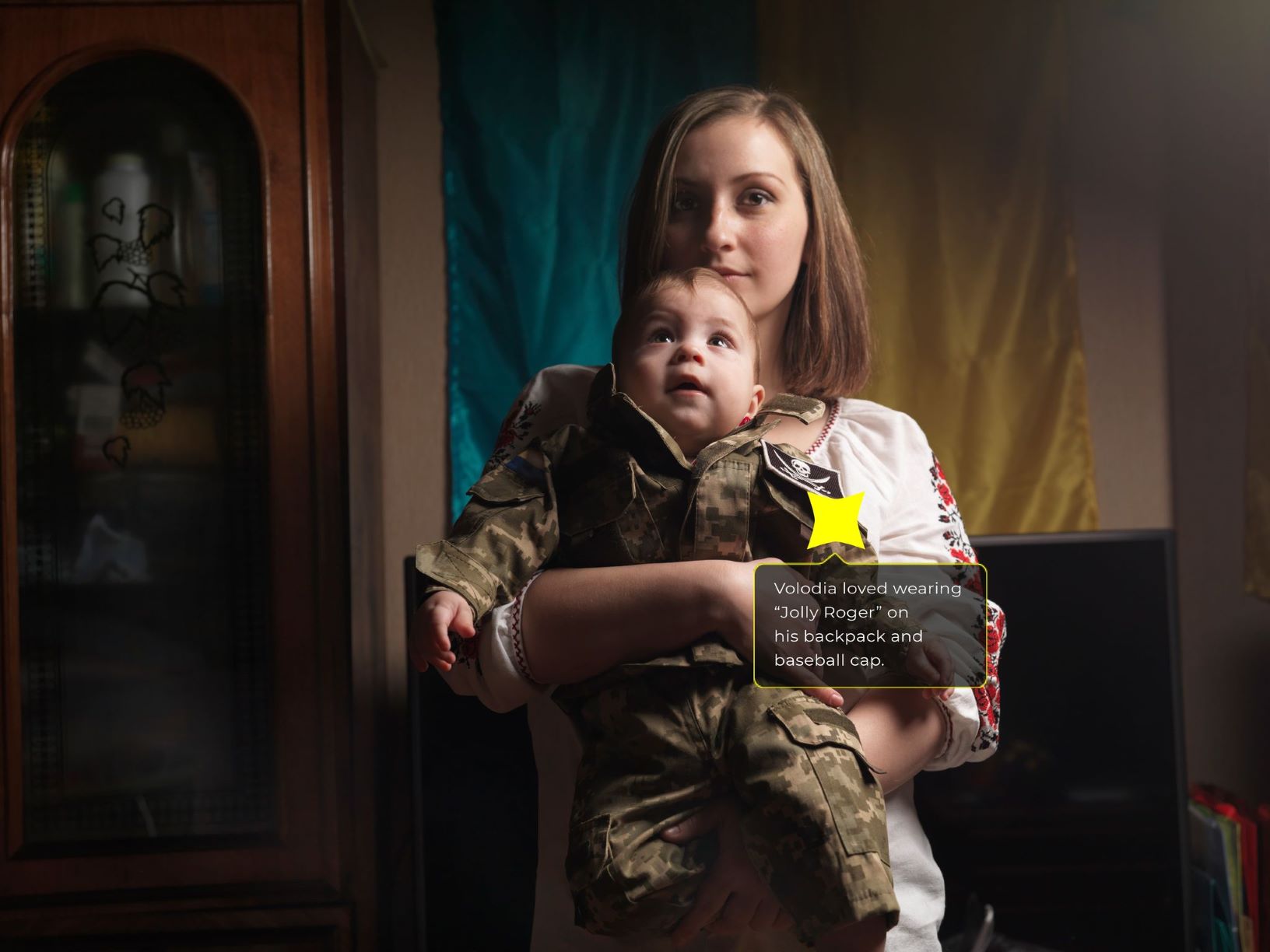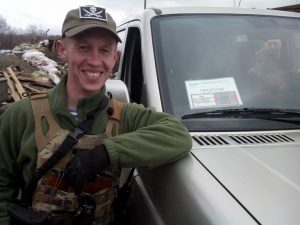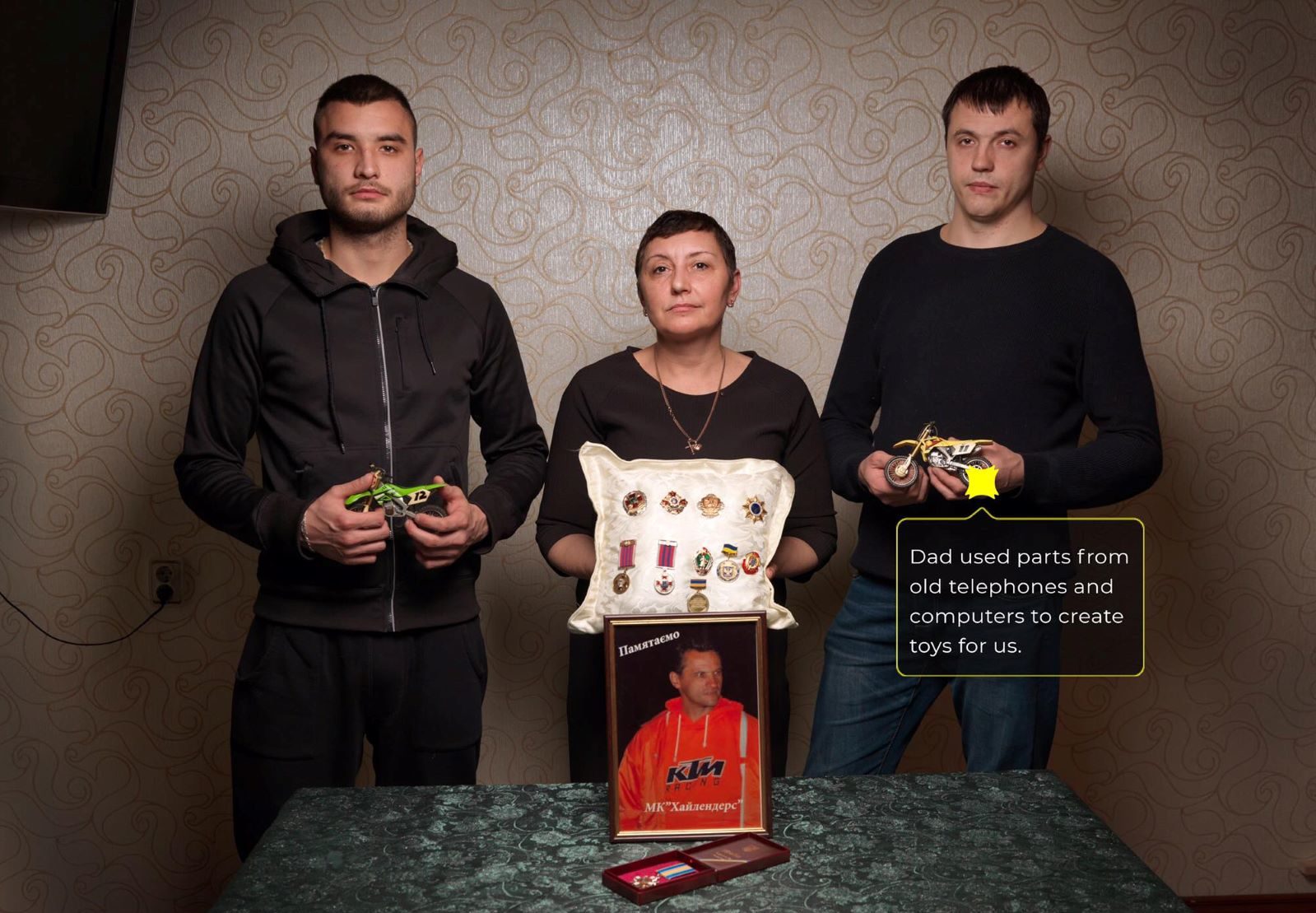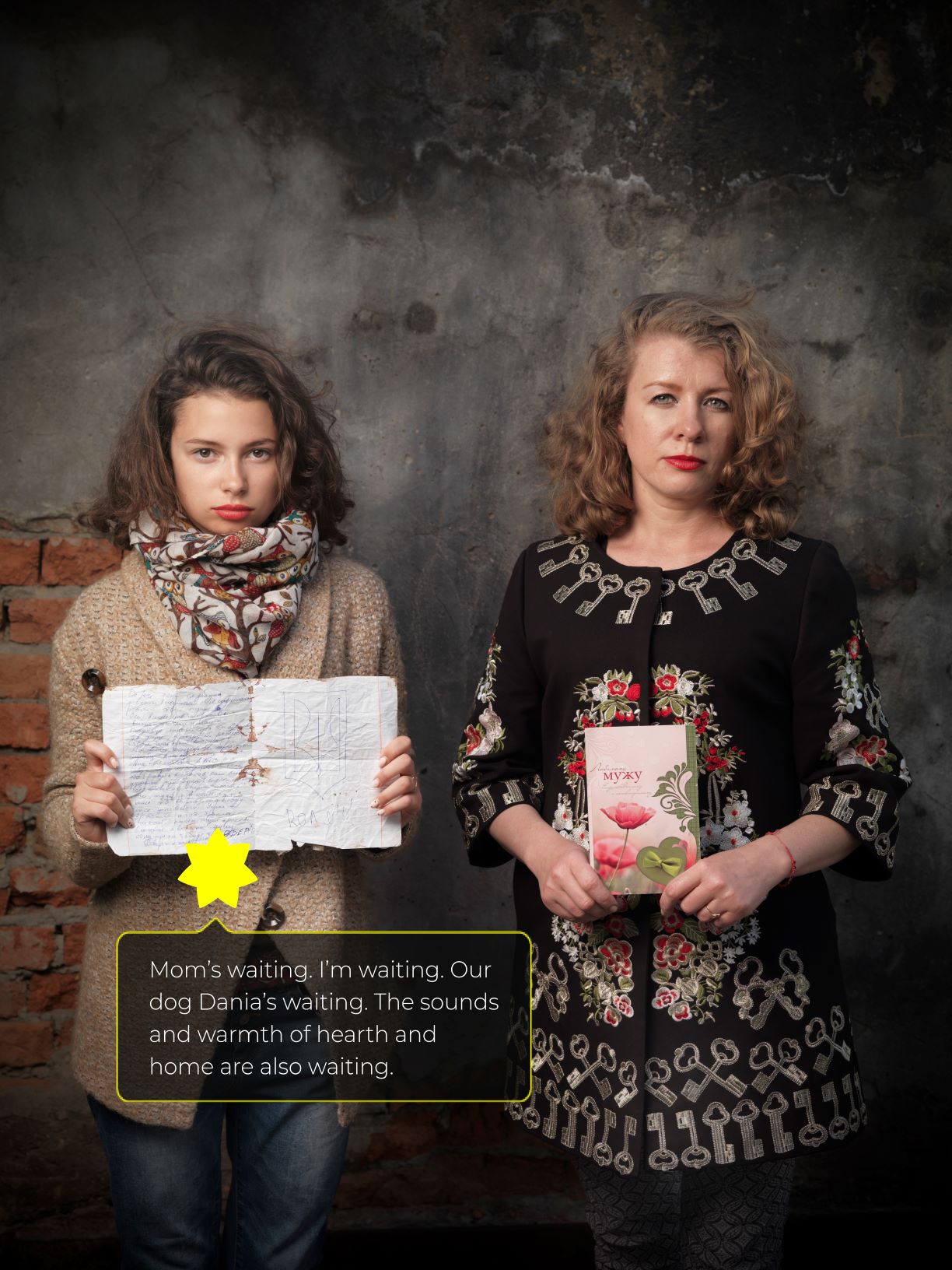The reconnaissance group was inspecting the banks of the Siverskyi Donets River and the area adjacent to the Luhansk TPP, when Volodymyr, who was leading the group, stepped on the mine. He managed to warn the others and covered an officer, but died of shrapnel wounds. Volodymyr Kyian served as captain in the 80th Separate Air Assault Brigade.
It is part of the Plus 1 project created to memorialize the fallen Defenders of Ukraine.
ABOUT VOLODIA, OLIA AND DANYLKO
Author: Oleksandr Irvanets
This story could have a fairytale beginning. Imagine:
Olia and Volodia lived in a beautiful old city. They met, decided to be together, and got married. A son, Danylko, was born. But, the war began. The men in Volodia’s family had always been soldiers… way back to his great-great-grandfather’s time, so he also went to war. And soon he was gone. Volodia was killed in combat. Olia was left with Danylko.
A very sad fairy tale…

Volodymyr Kyian, call sign “Typhoon”, company and deputy commander of one of the battalions of the 80th Brigade, was killed on September 3, 2015. He was able to visit with and hold his newborn son in his arms, and then returned to the front. Volodia had a military education, and went to the recruitment office as soon as the fighting began. At first, they didn’t want to take him – this never-ending bureaucratic mess in Ukraine. They couldn’t find his military documents. But, Volodymyr Kyian couldn’t just sit back and enjoy life at home… he enlisted in the volunteer battalion “Shtorm”. Comfortable, cozy Lviv with its coffee shops and tourists, a city where he felt at home, where he met Olia. This beautiful Lviv had to be protected. Volodia was a career soldier; he had fought in Iraq, so he clearly understood what was required of him. Someone had to go to defend this comfortable and peaceful lifestyle. Captain Volodymyr Kyian was well aware that this couldn’t be some abstract “someone”, but a real person – himself.
The “god of artillery” – that’s what his brothers-in-arms called him. A graduate of the Sumy Artillery Institute, Volodia was familiar with military affairs; he loved his profession and was a high-level specialist in his field.
It’s sad to write these verbs in the past tense: “was”, “loved”. Damn war…

On September 3, Volodymyr Kyian took his last breath on the outskirts of Schastia. Suddenly and tragically.
He was an intelligent and thoughtful man, but not silent. He spoke his mind, clearly and with conviction. During the war, Captain Kyian often met with the press, and in his interviews, he was always able to convey a deep understanding of the war, what it meant for Ukrainians, and what role he himself could play:
“The war has taught me to look at my country differently. I never considered myself a patriot. I never went around shouting “Slava Ukrayini!” (Glory to Ukraine!), etc. I was calmer and quieter about my loyalties, although I’ve always loved Ukraine. Today, I understand how hard it will be for me to lose my country. I realize that I need this country.
I got combat veteran status for my service in Iraq. Today, men who were never at the front receive combat veteran status. If that’s the case, I’ll readily give up mine; I don’t want to stand in the same line as those phantom fighters. I don’t need any privileges. We don’t defend our country to get benefits.
I still don’t understand one thing. Are we at war with Russia or not? If we’re at war, what the hell are Russian banks and the Russian embassy still doing on the territory of Ukraine? If we aren’t at war, then I’ll pack my things and leave. Russia is waging war against Ukraine, or at least sponsoring it. And people are dying every day. Russia has grabbed a piece of our territory, but we continue working with them. Why?”
Captain Volodymyr Kiyan voiced such perceptive and candid thoughts in many of his interviews, in particular, on the Censor.net website. He spoke reasonably and with great conviction, like a man who understands what he’s doing and has explicit criteria in life. He called a spade a spade, spoke calmly and without exaggeration, never referring to those who pull all the strings somewhere up there.
 I often think about something quite strange: personal relationships. There’s an old saying that marriages take place in heaven, but it seems to me that this also applies to relationships. In fact, these are alliances that are worked out between people. Some become close friends, to whom you can openly confess your troubles; others remain good friends, pleasant interlocutors, nice persons, with whom it’s interesting to exchange a few words. But, there are so many good and kind people that you’ll never meet or befriend in this short earthly life!
I often think about something quite strange: personal relationships. There’s an old saying that marriages take place in heaven, but it seems to me that this also applies to relationships. In fact, these are alliances that are worked out between people. Some become close friends, to whom you can openly confess your troubles; others remain good friends, pleasant interlocutors, nice persons, with whom it’s interesting to exchange a few words. But, there are so many good and kind people that you’ll never meet or befriend in this short earthly life!
Theoretically, I could have met the Kyian family by accident, because I often visit Lviv… and I’m a sociable person. But, it didn’t happen… I didn’t get to meet all the Kyians. Volodia was no more when I, the author of this text, decided to take part in the project. Marian Prysiazhniuk asked me to choose among several soldiers who had perished during the anti-terrorist operation; later, I could meet and talk with their families. I chose Volodia Kyian. He was from Kovel, in Volyn Oblast. So, in a way, we’re from the same region, as I grew up in Rivne. Yes, indeed, our Volyn is quite big, and Rivne is part of it, as well as some parts of Zhytomyr Oblast.
I called up Olha, introduced myself and we agreed to meet at Dzyga café. For me, this has always been the ideal place to meet friends in Lviv. Our first meeting took place on a cool spring day, so very typical of Lviv, when a sudden rainfall can briefly cast a thin shadow over the city, then suddenly brighten up again when the sun begins peeking over the old rooftops.
Olha appears on the left, arriving from Drukarska Street, pushing a folding baby stroller along the cobblestones of Virmenska Street. Danylo squirms impatiently in the stroller; he’s still a baby, not even one year old. Olia is short, with small freckles dotting her face, a friendly smile. Danylko has a short, snub nose, but so do most babies; he’s also smiling, and his smile’s much wider than his mother’s. We find a place outside, under a big patio umbrella. We’re wearing jackets, even though spring has officially arrived. It’s warm enough to sit outside, but, if you start feeling chilly, you can ask the Dzyga waiters to provide some blankets. We order coffee and tea, and begin conversing.
Olia’s from Dnipro. The city’s living its last days as the soviet Dnipropetrovsk; thanks to decommunization, it will become the Ukrainian Dnipro. But, Olha arrived in Lviv at a young age, a strong-willed girl, determined to start life from scratch in another place, away from her hometown. Add a drop of fiery, youthful tenacity, and such a step becomes quite logical and understandable. She settled in Lviv, got a job, and led a normal social life. One day, her life changed. Olia met Volodia.
Then, life continued, as in the above-mentioned fairy tale.
 I look at Olia and think of everything she’s been through. She lost her sweetheart. She lost the father of her newborn child. What should I ask her? Did Volodia see his infant son? Yes, he did. He was on leave in Lviv when Olia gave birth, just in time… he took little Danylko in his arms and hugged him to his chest. What then? That’s all…
I look at Olia and think of everything she’s been through. She lost her sweetheart. She lost the father of her newborn child. What should I ask her? Did Volodia see his infant son? Yes, he did. He was on leave in Lviv when Olia gave birth, just in time… he took little Danylko in his arms and hugged him to his chest. What then? That’s all…
Olia is strong; she’s all cried out. But, who knows what happens when she’s alone, when memories come flooding back. Life goes on, and Olia’s reason for living is sitting beside us, in a stroller. Olia pulls Danylko out and puts him on her knees. The little fellow bounces up and down actively, jerks his arms and legs, and looks around with a smile, exploring the world in which he’s destined to remain for many, many years. A world in which he’ll grow up as the son of a hero. A world in which there will be no father. How many challenges lie ahead for this little boy?! How much is yet to be discovered and understood?!
Olia talks about Volodia. He was a man one could count on. He was sure of himself, a man with clear moral and ethical ethics. He was an entrepreneur, working hard to put bread on the family table without asking the state for handouts. This is also a telling detail. He made decisions on his own, after careful consideration. So, when the time came, he made a conscious decision and went to war. This is evident from our interview. He realized that he had to be there, and left for the front. We need more of such decisive people. After all, how many real patriots do we actually see on the TV and in real life! Most of them are marionettes! Volodia Kyian was real, and this was clear from the very beginning.
A second meeting naturally follows the first one. Olha and I met only twice. We sit under the same umbrellas, only in lighter clothes with short sleeves. We drink coffee and tea again. Summer reigns over Lviv.
Danylko has grown. At such a young age, children shoot up before our very eyes. He’s cutting his teeth, and willingly shows them in his friendly smile. He’s put on some weight, and added the same proportion of energy. An angelic face framed by blonde hair… I silently wish him well; knock on wood. Olia has a harder time keeping him in line. He’s ready to start walking soon! He tries to scramble off his mother’s lap, but Olia pulls him back.
In Dzyga café, the coffee is served with waffle rolls containing a fortune wrapped in thick transparent paper. Danylo happily munches on the tubes with his baby teeth, crunching them joyfully between his teeth and crumbling them in his plump hand.
– Olia! Volodia came from a military family, so did it ever enter your mind that Danylko might want to become a soldier when he grows up?
Olia becomes thoughtful. She subconsciously hugs her baby closer.
– Mom is against it (probably, Volodia’s mother …) As for me…
Olia pauses again.
– He’ll live his own life…
Danylko has finished nibbling on the second waffle tube, turns to his mother and begins chewing on her finger.
-Hey there, my little Kyianchyk!… – Olia laughs and pulls her finger from between her child’s teeth. – Stop that!
She’s just uttered a simple, but meaningful word… “Kyianchyk”. How beautiful and affectionate this diminutive sounds! She probably used this name with Volodia when they were together. But, I dare not ask.
We say goodbye. I have another meeting at Dzyga café, but a little later. So, I get up and help Olia with the stroller, pushing it between the tables. Olia puts Danylko in place, straps him in like a parachutist, but he decides that it’s time to play. He tries to break free, laughing and crying loudly.
We walk along Drukarska Street towards Rynok Square; we walk past the museum, without turning into another street. The next block, it seems, is Serbska Street. Here, we say goodbye.
– Do you live far from the centre, Olia?
– Quite far. I get home by minibus.
– By minibus? With a stroller?
– The minibuses on our route are quite wide and spacious. – replies Olia.
I shake Olia’s hand and lightly pinch Danylko’s cheek: “Goodbye, little one!”
 I walk about twenty metres, stop and look back. Olia’s pushing the stroller along the uneven cobblestones. The little guy hasn’t calmed down; I can see his arms twitching and jerking. And next to Olia, I see Volodia… but he’s visible only to me. He has his right arm on Olia’s shoulder and smiles down at his son. The Kyian family moves away from me slowly along the narrow streets of Lviv…
I walk about twenty metres, stop and look back. Olia’s pushing the stroller along the uneven cobblestones. The little guy hasn’t calmed down; I can see his arms twitching and jerking. And next to Olia, I see Volodia… but he’s visible only to me. He has his right arm on Olia’s shoulder and smiles down at his son. The Kyian family moves away from me slowly along the narrow streets of Lviv…
I watch them from afar, holding my breath. A million questions flash through my head. Why did fate take him away? He was an intelligent and accomplished young man. He had so much more to offer to both Olia and Danylko, to others, to his country, to Ukraine! Am I letting my emotions get the better of me?
I have no answers to these questions.
This damn, damn war…
Some good news arrived from Kovel, Volyn Oblast while I was writing this story. Henerala Vatutina Street was renamed Volodymyra Kyiana Street in Volodia’s hometown. So, this story has a sequel. Not an ending, but a sequel.
The project is built around 22 individual exhibition stands. In iconic and powerful moments captured by a photographer’s camera – Youry Bilak, a Frenchman of Ukrainian descent – Ukrainian families tell the stories of their loved ones – Ukrainian soldiers who perished in the war. Each narrative, each individual is but one small grain, one tiny unit of a module in a living organism. By telling his story, we bring him back to life.
Each family chose an object that most reminds them of their departed: a father’s jacket, a guitar, a suit of medieval armour, a book. These family artifacts reflect a living continuation of the departed loved one. Ukrainian artists, intellectuals, and journalists were invited to create original texts about each soldier.








